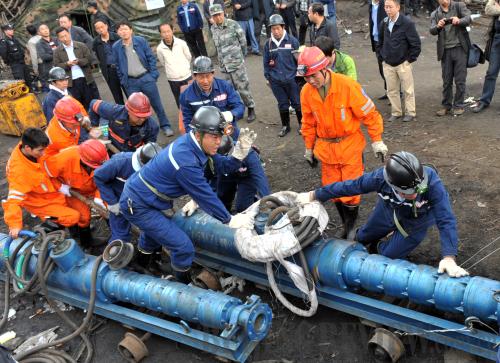|
 |
|
SAVIOURS: Emergency responders conduct a rescue operation at the flooded Xiahaizi Coalmine in Qujing City, southwest China's Yunnan Province, on April 7. Twenty-two miners were trapped underground by a flood early on that day (REN JUN) |
Healthcare Rules
Chinese authorities unveiled a barrage of new measures on April 9, which consisted of relaxing price controls covering non-public hospital services and encouraging the private sector to build healthcare institutions.
The measures were announced in a joint circular by the National Development and Reform Commission, the National Health and Family Planning Commission and the Ministry of Human Resources and Social Security.
The measures are aimed at giving private organizations more leeway to charge what they want for medical services and to encourage competition, according to the circular.
Authorities want private capital to enter the healthcare sector as soon as possible to increase the supply of medical services, and in turn to help ease the problem of inadequate health provisions available to the public.
The circular also specified that all provincial governments have to publicize a directory listing all public hospitals within their regions before the end of June.
Language Protection
Authorities in southwest China's Tibet Autonomous Region are enacting a new legally-binding regulation to safeguard the heritage and development of the Tibetan language, local authorities revealed on April 7.
The Tibetan Language Work Committee and other authorities in Tibet have finished drawing up a draft regulation, according to Chodrak, the committee's deputy director.
The regulation, which has gone through four amendments, is expected to come out in September.
According to the committee, the new regulation will provide legal protection for the rights and freedom of the people of Tibetan ethnic group to study, use and develop their language. In Tibetan areas, most classes are taught in Tibetan, though Mandarin and English classes are also on the curriculum.
Smog Forecast
An air-quality early warning system that will forecast smog two or three days in advance is to be put into use, the Ministry of Environmental Protection announced on April 3.
At a meeting on environmental monitoring, Vice Minister Wu Xiaoqing said that an air-quality forecast and early warning center covering the whole country is already in operation with an accuracy of 60 to 70 percent.
China began air-quality forecasts in 47 major cities in 1998. The new system covers all prefecture-level cities in the Yangtze River Delta, the Pearl River Delta, as well as the areas surrounding Beijing and other capital cities of provincial regions.
Wu called for improvements through remote sensing and other cutting-edge technology, as well as innovations in publicizing air-quality information. China currently has around 1,200 automatic air-quality monitoring stations across 252 cities.
| 